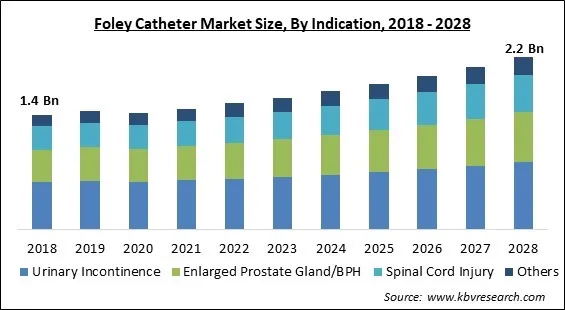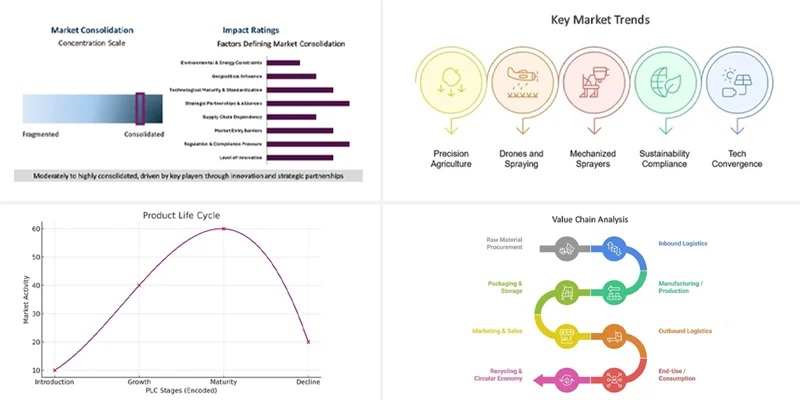The Global Foley Catheter Market size is expected to reach $2.2 billion by 2028, rising at a market growth of 5.4% CAGR during the forecast period.
The foley catheters are flexible tubes that are inserted into the bladder to drain urine. These are the most commonly used catheters. The tube comprises two separate channels. One of them opens at both ends to drain urine in a collection bag, and the other lumen has a valve at the outside end that connects to a balloon at the inside tip.

The balloon is filled up with sterile water when it is inserted inside the bladder to prevent it from slipping out. The most commonly available type of foley catheter is silicone based on coated natural latex. The coating includes hydrogel, polytetrafluoroethylene, or a silicone elastomer. All of these have different characteristics, and this coating helps in determining whether the catheter is adequate to use for 28-day or 3-month indwelling catheters.
These catheters should be used only when suggested by the clinician as the use of foley catheters is associated with the risk of developing urinary tract infection or other adverse effects. Foley catheters are also known as indwelling catheters, as they can be left in place in the bladder for a longer duration of time. The catheter is placed with a balloon at the end.
The urine drains to the attached bag via a catheter tub. The inserting procedure is known as catheterization. Foley catheter could be needed in many disorders and procedures, including urine output monitoring in a critically injured or ill individual, nerve-related bladder dysfunction like after spinal trauma, collection of a sterile urine specimen for diagnosis, and imaging study of the lower urinary tract.
Considering the disturbing healthcare trends, the government of several nations is making various efforts to serve with best possible healthcare facilities to patients across the globe. Lockdowns imposed in various nations and postponement of less required surgeries are other factors responsible for the decline in market growth. Although, in the second phase of the pandemic, the market is predicted to have a speedy recovery. Most of the healthcare providers recommenced elective surgeries in the second phase as a result of the loosened restrictions by the government. Further, key market players wish to expand their business and thus are building warehouses in new locations, supporting market growth.
The prevalence of urological disorders is rising across the globe. Urologic disorders and conditions affect almost all ages, induce high healthcare costs and could even result in disability and negatively impact the quality of life. Kidney stones, urinary tract infections, and urinary incontinence are some examples of non-cancer urological diseases and health issues. As a result of this, the rising number of urological disorders is anticipated to contribute to market expansion across the globe.
According to the World Health Organization, the number of people aged 60 and above is gradually rising. The number of old aged people in 2019 was 1 billion. This number is predicted to reach 1.4 billion by 2030 and 2.1 billion by 2050. The number is increasing at an unprecedented pace, especially in developing nations. This imposes immense pressure on healthcare providers to provide better facilities to tackle the situation. Thus, the demand for foley catheters would grow due to the widening base of the old aged population.
Various risks are involved in the insertion and the use of foley catheters. There are chances of ballon breakage during the insertion of foley catheters. In such cases, doctors may remove all the balloon fragments. The problem could occur if the catheter balloon does not once it is inserted. In most cases, the doctor does check the inflation before inserting the catheter in the urethra. Once insertion is done, there are chances that urine may stop draining into the bag. Urine flow cold gets blocked in the catheter. In such cases, the need to change the bag or even the foley catheter may arise. All these possible complications associated with using foley catheters may restrict the usage of foley catheters, thus, impeding the market expansion.
Based on product type, the foley catheter market is segmented into 2-way foley catheters, 3-way foley catheters and 4-way foley catheters. The 3-way foley catheters segment acquired a significant revenue share in the foley catheter market in 2021. The three-way catheters consist of three ports, one for draining urine, the second for balloon inflation, and a third port to irrigate the bladder for preventing and managing blood clots. The 3-way foley catheters enable continuous bladder irrigation

On the basis of material, the foley catheter market is bifurcated into silicone, and latex. In 2021, the silicone segment held the largest revenue share in the foley catheter market. The silicone-based catheters have a lubricious covering that is permanently pervaded with ions. The ionic bonding keeps the silver in a hydrophilic coating. The silicone coating resists the bacteria and impedes microbial colonization on the surface of the catheter. The key benefit of this type of catheter is that they are adequate to be used for the person with sensitive skin as they are non-allergic.
By indication, the foley catheter market is fragmented into urinary incontinence, enlarged prostate gland/BPH, spinal cord injury and others. In 2021, the urinary incontinence segment witnessed the highest revenue share in the foley catheter market. Urinary incontinence refers to the involuntary loss of control of the bladder. The condition could be developed due to various factors, including UTIs, changes in the urinary tract due to aging, and the pre-existence of health issues such as stroke, cancer, diabetes, and mobility impairment.
Based on end-user, the foley catheter market is classified into hospitals, long term care facilities and others. The long-term care facilities segment recorded a prominent revenue share in the foley catheter market in 2021. This is due to the growing acceptance of minimally invasive surgeries and the cost-effectiveness of treatment provided in these facilities. These facilities provide benefits such as shorter hospital stays, same-day release, and faster procedure time and thus are most preferred by the patients.
| Report Attribute | Details |
|---|---|
| Market size value in 2021 | USD 1.5 Billion |
| Market size forecast in 2028 | USD 2.2 Billion |
| Base Year | 2021 |
| Historical Period | 2018 to 2020 |
| Forecast Period | 2022 to 2028 |
| Revenue Growth Rate | CAGR of 5.4% from 2022 to 2028 |
| Number of Pages | 234 |
| Number of Tables | 440 |
| Report coverage | Market Trends, Revenue Estimation and Forecast, Segmentation Analysis, Regional and Country Breakdown, Companies Strategic Developments, Company Profiling |
| Segments covered | Indication, Product Type, Material, End-user, Region |
| Country scope | US, Canada, Mexico, Germany, UK, France, Russia, Spain, Italy, China, Japan, India, South Korea, Singapore, Malaysia, Brazil, Argentina, UAE, Saudi Arabia, South Africa, Nigeria |
| Growth Drivers |
|
| Restraints |
|
Region wise, the foley catheter market is analyzed across North America, Europe, Asia Pacific and LAMEA. In 2021, the North America region led the foley catheter market by generating maximum revenue share. The rising prevalence of chronic kidney diseases (CKD) and the increased elderly population in developed regional nations such as the US, is a primary factor supporting the region’s growth. In addition, the growing preference for minimally invasive surgeries and the presence of a large number of urologists in the United States is the major factor driving the market expansion in North America.
Free Valuable Insights: Global Foley Catheter Market size to reach USD 2.2 Billion by 2028
The market research report covers the analysis of key stake holders of the market. Key companies profiled in the report include Medtronic PLC, B. Braun Melsungen AG, Cardinal Health, Inc., Bactiguard Holding AB, ConvaTec Group PLC, Teleflex, Inc., Coloplast Group, Sterimed Group, GWS Surgicals LLP, and Hollister, Inc.
By Indication
By Product Type
By Material
By End-user
By Geography


The global Foley Catheter Market size is expected to reach $2.2 billion by 2028.
Increase In Occurrence Of Urological Disorders are driving the market in coming years, however, Complications Associated With The Use Of Foley Catheters restraints the growth of the market.
Medtronic PLC, B. Braun Melsungen AG, Cardinal Health, Inc., Bactiguard Holding AB, ConvaTec Group PLC, Teleflex, Inc., Coloplast Group, Sterimed Group, GWS Surgicals LLP, and Hollister, Inc.
The 2-way segment acquired maximum revenue share in the Global Foley Catheter Market by Product Type in 2021 thereby, achieving a market value of $1.1 billion by 2028.
The Hospitals segment is leading the Global Foley Catheter Market by End-user in 2021 thereby, achieving a market value of $1.2 billion by 2028.
Our team of dedicated experts can provide you with attractive expansion opportunities for your business.

